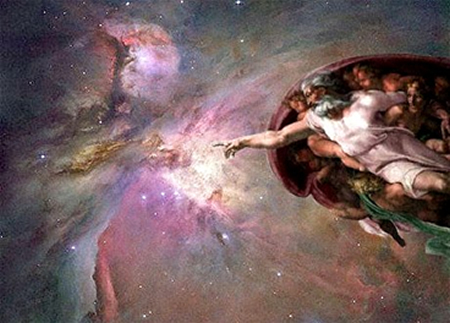Getting back to our quest, which from the beginning has been to find the origin of Man, we find ourselves unwittingly in the position of Socrates. We have consulted the experts, and in return we have received what, upon close inspection, appears to be little more than decorated (and applauded) guessing. Like Socrates, even though we are not necessarily experts, our criticisms have been justifiable on numerous grounds. When specialized fields of expertise invade day-to-day society, as for instance when their conclusions become the basis of civil law, guide the direction of progress and science, and set the school curriculum, they unjustifiably extend their influence beyond the bounds of their particular discipline. They ooze out into the world and once they do so they may be critiqued and, indeed, criticized, from other and wider perspectives. This questioning of all the experts he could find made Socrates many enemies, and I think it is a foregone conclusion that it was the primary reason for the charges that brought him to the Athenian court. Experts do not like to be told they are wrong, especially by people not trained in that expertise.
By questioning the Big Bang Theory, Evolution, Archaeology and Anthropology, Astronomy, Microbiology, accepted methods of dating and measuring, and numerous other primary scientific (and, occasionally, even literary and linguistic) assumptions, by speaking about religions to which we do not belong, by interfering with the common contemporary mythos, we discover that these criticisms strike directly at a belief system shielded and guarded with all the defense mechanisms of a repressive psychosis and Fort Knox under threat of red flag. You tell even your friend Bob that his wife/job/dog/house/car/idea is just no good, and in fact can prove it, and instead of getting thankful gratitude in response you get something along the lines of “Who do you think you are to say such things…” blah blah bah. The end result is that in society today people are too often reluctant, even afraid to tell other people what they really think about those things that really matter, and even worse, few take the time to question the premises and assumptions of even their very own worldviews.
When it comes to the ideas called Big Bang and Evolution, these fantasies have crystallized in the mind of their adherents, and there take the form of infallible Truths, and indeed, become a stand-in for God. The Big Bang – Evolution pair, taken as one, we might term “Bangolution”, an allegedly scientific theory that in reality has all the defining characteristics of a religion, but a religion purposefully atheistic and consequently moral-less, a theoretical mathematical construct fraught with difficulties and inconsistencies even by its own evidence. Yet, like a religion, it is believed with the same strength of commitment as any other. It becomes “family” and “dear” to its believers, and any criticism of it is therefore considered insulting, if it is heard at all.

The real loons, the peculiar type of religious fanatic so steeped in the theoretical tea that they have ceased to have any individual character, the ones who become Bangolutionists body and soul, and so who baptize themselves in imaginary waters, they will never change, they will continue to worship their fabricated god-double even if it is proven to be a man-made fabrication. Such scientific devotees are the exact equivalent of religious zealots, maniacal followers who not only refuse to hear any blasphemy against their “god”, but who would drink any poison, bomb any building, or kamikaze any ship, in order to defend their icon.
Then there are the other type of Bangolutionists, more prone to question the principles, more prone to search themselves, more inclined to think outside the box, but Bangolutionists body and soul nevertheless. These Bangolutionists are more of the truly advancing scientific spirit type, one could say they are the “liberal” Bangolutionists. They believe, so they say, because it is “the best available” theory. Their response to my inquiry would be to say that instead of criticizing I should “come up with a better idea”, and they claim they would accept a better theory if one is shown to them. They want a better game, they say, they seek a new and improved myth, and would be willing to change their allegiance if shown one.
Theory can support, directly, only other theory. It may propose any scenario, scheme, or fairy tale it likes, and upon such shaky foundations build even more elaborate crystal sandcastles, fabricated out of similarly constructed imaginative phantasms. Theorists justify the worth of their creations using similarly made-up words and concepts. Using this method, as the computer world seems to demonstrate, they can, via this theory borne of imagination – and maybe a few hallucinogens – construct a whole new “virtual”, or some odd other, type of world. But the moment they try to apply these concepts to the real, waking world we actually live in, where also other flesh-and-blood human beings exist, they create a whole new set of circumstances, and a whole new set of interactions and relationships. Their enterprise, at that point, now extends beyond the scope of a roomful of hackers (or theoretical physicists), and its impact on everyone must be considered.
Take for example the new concept of the “virtual world”, such as the computer-based “multiplayer” worlds people play, those popular games and the simulations meant to mimic real life in actual time. Much theory goes into building these worlds. The programmers, the creators, have to consider graphics, sound, game play, processing power, internet speed, and so on, when designing them. Like the Earth itself, before getting into actual game rules and play at all, indeed before even one character or man is made, a whole firmament must be set into place. This firmament for real humans is the atmosphere in which they operate, and for the virtual world it is those conditions which allow the game to take place. In a virtual world the firmament is in cyberspace, in a real world, regular space. The real world’s firmament is composed of restrictions such as involve the limits of sight and perception of distance, and the impositions of gravity, velocity, and laws of thermodynamics, and the virtual world’s firmament also works with such unmitigated constants.
To the layman, someone not an expert in (virtual) world construction, when the “way” and “how” the creation of even the simplest game world is explained, the barrage of new terms and procedures sounds like a foreign language. Calculations and algorithms, if-then propositions, peculiar measurements the game makers themselves invent, and the like, are like unfathomable hieroglyphics to the uninitiated. Yet, while the language is unknown or a matter of no concern to the players, the principles of these games, even the way they are played, are easily recognized. Most laymen, most players of these games, make little or no effort to understand how they work. A well-made game, furthermore, intuitively makes sense, and while it is true that a few players become seekers – and find their special secrets and Easter Eggs, or discover the hidden lore or cheat codes in the game- most are content to just play and have fun.
As you can see, a new virtual world real-time video game is a near perfect analog of human existence in the world. For our purposes here this virtual world can also stand for any theory, and particularly, any scientific theory, as really these similar constructs are also human-invented games we are asked to entertain. We should have no ethical problem or issue with theory in this sense any more than we should have any reason to object to a video game – if you like it, play it.
As long as a theoretical game remains isolated, that is, as long as it stays purely theoretical – we can say, in Beta stage – it can do whatever it wants, base its system on whatever premises, possible or not, shady or not. At some point, however, the creators of this game-theory want it to “go live.” They want people and so society and the world to participate in this game. They want to be the chosen game everyone plays.
When this happens, when a game is actually presented to the public, as any programmer will tell you, further problems can and do arise, and must be accounted for, either by changing code or the game itself. This is very much like what happens when scientific theories are applied. When these difficulties are encountered, and they almost always are, the theorists-developers sometimes change the principles, and sometimes change the theory itself, to try and fix the problems. Once a person not involved with the creation of the game becomes a player of it, that person must also be accounted for by the game-theorists. Human interaction is another whole and new ball game. Who is affected and in what way psychologically and physiologically, will it make players dizzy or violent, how long can someone play, etc., all these now become legitimate questions. Whereas before its public release the game or theory was just a mental exercise among friends, a hobby if you will, now it is a public fact.
As a concept in the public domain, the game/theory can be criticized at least where it intersects with the real world, that is, where it affects actual day-to-day 3D human life. The Big Bang Theory game, we could say, is fine at the We Teach Physics convention. But once it touches a school system or private home, or intrudes on the lives of those who either have decided not to play or don’t know anything about it, it must justify itself and the intrusion, and answer using concepts and language we can understand.
Sometimes, after it exists for a while, it is discovered that the game is just no good. Perhaps it has many known flaws, or it is boring and so nobody plays it, or it is too complicated; considering the game as a theory, no one believes it. What happens usually, because we people like to improve ourselves and we also like to play games, is that a new, lauded as better game is created to take its place.
Big Bang, Evolution, these are big theoretical games lots of people continue to play, and which affect, directly or indirectly, billions of people. The main problem with these open-ended, ever-amenable theoretically pragmatic games is, in a nutshell – and I think, as we have shown – is that they never end. It is always in name the same game, one I dare say we, at this point, may be unable to escape, but one that changes not only its rules, but itself. When a mistake is found in these games, Evolution and Big Bang, or when people downright get fed up with them since they are all but useless, instead the “game theorists” merely change the game, or worse, the very rules of the game. When we say “It is bad, close it down” they make changes (“patches”) to make it appear good for a little while longer.
After changes are made, should it be called the same theory? How many characters, plots, rules, and codes can be changed and it still be considered the same game? At what point does Space Invaders become Galaga? Much more importantly, should a person or corporation be allowed a patent on what never ends, like Windows operating system? Should you have to rent a product that changes on a weekly basis?
It boggles the mind to consider the breadth of distribution of these humongous, yet often silly games. Saying or writing that such games or theories are based on bad or unproven principles must be done with full acknowledgment of the wide scope of this participation. These biggest games are so massive that they appear immune to criticism, being ever-amenable, with constantly changing rules and “truths” by which they might, apparently, withstand any critical blow. Indeed, how does one permanently kill a monster that keeps coming back to life?
It should be noticeable to all, and a certain Truth if any there be, that aspects of this theoretical game world are interacting with, or maybe better to say creeping into, the real world. It is precisely at this point that theory becomes accountable to the “non-professional”, like me or any other critic with half a brain. When the game’s conclusions extend outside the game and reach non-players (non-believers) it may be criticized from the non-players. A similar principle is behind Child Safety Laws, the almighty Seat Belt, and the Health Departments, whose mandates similarly intrude into personal affairs, but which at least have (real…or imagined) greater good as the goal. That the “external” or non-professional critics – of theory, or games, or certain laws – are more or less ignorant of how the game was programmed (or the mathematical intricacies of the theory…or the history of the statute…) really doesn’t, and shouldn’t, make any difference. In a nutshell, I have no problem with your, let’s say, zombie game, nor with folks who play it, unless it is because of your game that my kids are being coerced or somehow led to believe actual zombies exist. Now you must prove the existence of these zombies, and to say they exist because the game says so – the exact argument used so many times to justify Evolution and Big Bang – is just plain gibberish.
Of course, the difference between the games we love to play and the games we are forced to play should be evident. So far we have not based any laws on Final Fantasy or Angry Birds. These games have stayed for the most part in the gaming world. But when that one action figure of Cloud or the Bomber bird hits the shelves, like any theory, it will have to pass through several tests and safeguards, it will have to pass inspection. All we are asking is for fair, unbiased inspections of these relentless, mutable, and never-ending types of theories that affect the world.
That old decrepit rat of an argument known as “where are your papers/credentials” hopefully now buried for good, I want to confirm a few definitions and maybe clear up a bit the ambiguity that is the title of this section. We men and women, we Men, are very well individuals at bottom, by nature isolated, alone, and without equals, as Sartre might have said. On the other hand, we are also, by nature, complex social creatures, as perhaps Aristotle might have meant when he called us “political animals”. Throughout this search to find the origin of Man we have never really spent much time defining precisely what origin it is we seek. That is, we have not defined what we mean by “Man” as well as what we mean by “Origin”. Man, yes, means both men and women, but which men and women?
What is a Man? That is our next section.










